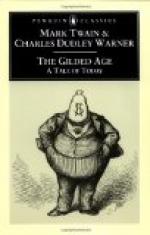“To be sure, I only care about it for the boy,” he said. The Squire was like everybody else; sooner or later he must “take a chance.”
It is probably on account of the lack of enterprise in women that they are not so fond of stock speculations and mine ventures as men. It is only when woman becomes demoralized that she takes to any sort of gambling. Neither Alice nor Ruth were much elated with the prospect of Philip’s renewal of his mining enterprise.
But Philip was exultant. He wrote to Ruth as if his fortune were already made, and as if the clouds that lowered over the house of Bolton were already in the deep bosom of a coal mine buried. Towards spring he went to Philadelphia with his plans all matured for a new campaign. His enthusiasm was irresistible.
“Philip has come, Philip has come,” cried the children, as if some great good had again come into the household; and the refrain even sang itself over in Ruth’s heart as she went the weary hospital rounds. Mr. Bolton felt more courage than he had had in months, at the sight of his manly face and the sound of his cheery voice.
Ruth’s course was vindicated now, and it certainly did not become Philip, who had nothing to offer but a future chance against the visible result of her determination and industry, to open an argument with her. Ruth was never more certain that she was right and that she was sufficient unto herself. She, may be, did not much heed the still small voice that sang in her maiden heart as she went about her work, and which lightened it and made it easy, “Philip has come.”
“I am glad for father’s sake,” she said to Philip, that thee has come. “I can see that he depends greatly upon what thee can do. He thinks women won’t hold out long,” added Ruth with the smile that Philip never exactly understood.
“And aren’t you tired sometimes of the struggle?”
“Tired? Yes, everybody is tired I suppose. But it is a glorious profession. And would you want me to be dependent, Philip?”
“Well, yes, a little,” said Philip, feeling his way towards what he wanted to say.
“On what, for instance, just now?” asked Ruth, a little maliciously Philip thought.
“Why, on——” he couldn’t quite say it, for it occurred to him that he was a poor stick for any body to lean on in the present state of his fortune, and that the woman before him was at least as independent as he was.
“I don’t mean depend,” he began again. “But I love you, that’s all. Am I nothing—to you?” And Philip looked a little defiant, and as if he had said something that ought to brush away all the sophistries of obligation on either side, between man and woman.
Perhaps Ruth saw this. Perhaps she saw that her own theories of a certain equality of power, which ought to precede a union of two hearts, might be pushed too far. Perhaps she had felt sometimes her own weakness and the need after all of so dear a sympathy and so tender an interest confessed, as that which Philip could give. Whatever moved her—the riddle is as old as creation—she simply looked up to Philip and said in a low voice, “Everything.”




